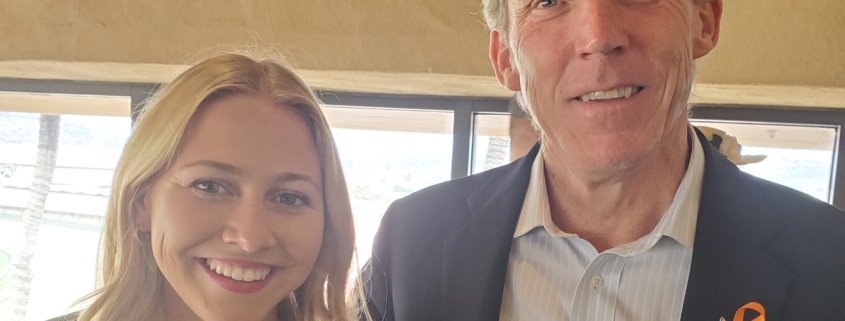John speaks to us from Narberth, PA where he grew up.
Archive for year: 2021
We do sales training. At least that’s what I tell people at a cocktail party or BBQ because if I tried to say what we really do, which is help our customers refine and implement a repeatable process to drive revenue, I’d get a lot of blank stares.
But when I’m speaking with a commercial leader of a mid to large size organization, they get it. Because the work we do is fundamental to the tactical execution of their go-to-market strategy. And companies spend millions of dollars on getting their strategy right.
We help our customers improve the quality of the sales opportunities they develop and increase the overall revenue in their pipeline. All sales organizations are focused on this, and we enable it with a skills-based program that is custom built for our customers based on the markets they compete in and how organizations buy. Sales effectiveness is about understanding buying, not about refining your sales pitch.
Our source of pride is twofold. First, we have helped the individuals in our customers’ organizations improve their success. This is important monetarily, but even more so when you hear the effect it has on their families—that makes my heart sing. And second are the many, many customers who have come back to buy from us again; some twice, and some even more. This repeat business is a testament to our process and reminds me we are doing something right.
I can’t believe it was sixteen years ago when the company I was working had just been sold, and my wife Septembre asked me “what’s next?” I told her I wanted to do something that combined what I love and what I am good at. She just said, “then go do it!”
That was a leap of faith from a wonderful wife, one that included a 3-year-old son and 6-month-old daughter, to go back out as an entrepreneur, build a business and follow my passion. No base salary, no benefits—just belief, support and a loving, positive atmosphere.
The first 13 months were hard work—digging for commercial sales opportunities in a sea of competition that had some large players, many middle tiers and a ton of small companies. It was a benefit that I underestimated the task and didn’t realize just how much competition was out there. Instead, I just went for it with a relentless energy level and a good network of contacts from my twenty years in sales. It was hard work, but the wins and success stories from our customers have far outweighed the hassles. Jim Brogan, a longtime friend and former NBA player summed it up well when he told me “the success is in the struggles.”
Today, I feel blessed to have the right people around me (personally and professionally), an offering that I know can help others succeed, and rewards that go well beyond compensation. Let’s just call it a dream.
While attending his 26th Rolling Stones Concert, John discusses high performance management from Minneapolis. How do your KPI’s match up with revenue generation?
Many dedicated professionals (doctors, lawyers, CPA’s) have requirements on Continuing Education (CE) and knowledge standards to remain active in their specific trade. Oddly, Sales Professionals do not have a dedicated licensing body-imagine if we did? Buyers may appreciate it.
The place I go 2 to 3 times per year to get caught up on the most important topics in Sales is the Selling Power 3.0 Conference series hosted by Gerhard Gschwandtner. Year in and out, Gerhard assembles the most interesting, diverse, deeply talented speakers and topics to keep Sales Leaders informed as to what is happening in the Buyers and the Seller’s worlds. If you haven’t taken part, I strongly suggest that you do. In fact, if you read this far, and want to go to the next 3.0 Conference, I will pay for it-let me know. Good selling.
Your sales team is one of the greatest assets your company has. But how do they maintain your company’s strong standing and keep the company moving forward? They utilize sales strategies. The organizational practices of your sales team can make or break your business. Without them, your business isn’t going to produce the results you want to see.
A late businessman, William Clement Stone, once said: “Sales are contingent upon the attitude of the salesman, not the attitude of the prospect.” A great place to start is by looking at your top sales people. What do they do to keep the prospect’s attention? How are they closing so many successful sales? How do they keep their head high when a sale falls through? Try analyzing the habits of your best sales people and see what you can come up with. Your sales team will succeed directly based on the attitudes and high standards they set for themselves.
Here are some practices to help maximize your team’s performance:
- Analyze your success
Don’t wait for the metrics and stats given to you by your manager to track your progress. Analyze each sale and failure to see how you can improve for the next time. Not only will this help you for future sales, but will also show your manager how on top of your work you are. It’s a win-win for everyone.
- Set rules in place, but don’t nag
Sales teams thrive when they have strict components to follow. However, that doesn’t mean that you need a sales manager to be breathing down your back each minute to make sure that you’re doing what you’re supposed to do. One of the keys to a successful sales team is to let each member get in their own schedule that works around the teams’ schedule. Sales people shouldn’t have to stop and check-in every 30 minutes. Let them find their own routine so they can work at the best of their abilities.
- Encourage your prospects to engage before the end of a meeting
Most sales people wait until the end of a meeting to allot time for questions and comments. Why wait until the end? Tell your prospect at the beginning of the meeting to ask questions or explain their concerns when one arises. This could make your prospect more satisfied because every question they have will already have been answered. This small change can increase your closing ratios significantly.
- Never skip a follow-up opportunity
Most sales don’t close on the first contact, maybe not even on the second. It can take multiple touches to get your potential clients to trust you and your product. Do not hesitate to follow up. These opportunities just may be your actual sale.
- Know what you want
Have a purpose before starting your sales. What goal do you want to achieve? Habits like this make your salespeople find a direction they want to take and stick to it throughout the process. The best sales people know what they want before starting so they know what they are aiming for and every action they make gets them closer to success.
- Utilize KPI’s
Meaningful metrics tie performance levels to behavioral changes that make good salespeople even better. KPIs are a good way to increase profitability for your business. Salespeople use KPIs to measure long-term success. While it isn’t an exact measurement, it is better than making an educated guess to forecast your sales growth. It can be useful to measure month-to-month growth, year-to-year, etc. Even using KPIs to measure the amount of time your salespeople are on the phone can be useful. Utilizing this technique can keep you ahead and focused on your firm’s goals.
- Celebrate
Celebrate after each sale! This is a habit that can be done with the sales manager. Hang up a bell that your sales people can ring each time they make a sale. Or find something else that your sales people can do to let others know they’ve helped the company get one step closer to your goal. Celebrating is a great way to boost morale.
Sales teams are key players in your business. Focus on collaboration. Each effective habit will lead the team to remember the bigger picture. Each sale is a celebration of your team, not just the individual. What other habits does your sales team use to maximize performance?
All organizations, be it a company, team, family, musical group, etc. have individual contributors who play a part for the greater good. Some of these roles are well defined, and others just emerge as the unit develops over time, seeking ways to offer solutions, support, enjoyment or sustenance in a variety of ways.
Last month, Charlie Watts died at age 80 after a long, wonderful career and life. His contributions to the Greatest Rock and Roll Band in The World are enumerable. And why he did accomplish so much within his particular artistic capacity, most of the fans and writers are discussing how he did it. With great precision in his drumming craft, consistent through and through and all within the confines of humility. The latter doesn’t sound very rock and roll, but neither was Charlie Watts.
As a follower of The Stones for 40 years, and having attended 29 of their concerts, I shared so many great memories over the years with and through their music. As a member of several organizations, it is always interesting to watch those steady, consistent high performers who show up day after day and deliver results. That was Charlie Watts- no flash, no sizzle, not running from one side of the stage to another, just getting it done. We need more individuals like that, in Sales teams, sporting clubs and families. The ones who keep the beat through and through.
Thank you for the memories, Charlie. A long life well lived. Peace.
There are several skills that require mastery to be successful in Sales, but none is as important as finding new opportunities. Proactive new business development must happen. Every day. The inability to do this causes more problems for Sales Management than anything else. Stay ahead of the curve with a simple, executable plan to fill the funnel.
The key to success for any salesperson, whether they’re new or they’ve been in the field for years or decades, is proactive new business development. I spend four days a week doing so, filling the top of the pipeline with new opportunities
A few things that you’ve got to commit to:
- First, dedicate the specific time to prospecting. Put it in your calendar and don’t move it if it’s one hour a day. Don’t let other things encroach in that valuable time.
- Second, do you have the tools ready to drive those conversations? Calling on the key players in your market segments? Do you have the dialogue ready to engage them in conversation?
- Thirdly, do you have the technology or the tools like a CRM and the other email follow-ups, whether that’s through LinkedIn, etc. whatever it is, have it ready to go in your efforts.
- And then lastly, structure accountability. I’m not concerned with how many dials or contacts you make, how many connections did you get through? Hold yourself accountable to that. If you do these things, the pipeline’s going to fill up.
I’d love to hear what’s working from you. Good selling.
Hana Van Voorst is our guest article writer this month. She just completed a 6 month role with us before heading off to France for Business Graduate School. Bon Voyage, Hana !
—————————————————————————
As I embark on a new journey to Montpellier, France for a Master’s in International Business, I’ve been reflecting on my time as a Marketing Researcher at Flannery Sales Systems (FSS). As a recent graduate of San Diego State University with a degree in International Business and Chinese language, I was very eager when John offered me an opportunity to work with their Marketing team. Although I didn’t know much about Sales, I was excited to learn. Little did I know, Sales would be just the beginning.
During my eight months, John gave me so many opportunities that weren’t just basic Marketing or Sales. Due to my interest in languages, I was assigned to work mainly with their translation and localization clients. This was a field of work that I never knew existed, but I was able to sit in on Sales training sessions with people from all over the world. I even got to participate in their training activities while coordinating the Zoom logistics. This active participation taught me about not only Sales but business in general. Whether you’re selling a product, an idea, or yourself, it’s more than just a transaction. It’s about establishing a credible relationship and focusing on the customer’s business objective and not just the product. This concept and many others that I learned through multiple trainings has given me a well-rounded perspective about the actual world of Sales instead of just the stereotypical one.
I also greatly enjoyed meeting new people with such a passion for languages. John set up separate networking calls for me to connect directly with these companies to gain more insight about the translation industry. I even met one client from France who helped me with my move to Montpellier including information about visas, accommodation, and French culture in general. This was such a great connection, and it made me feel more comfortable about my moving process.
These are only a few of the many things I gained in my months at FSS. John gave me the freedom and responsibility to problem solve with his guidance. I was able to learn project management, data analysis, and customer relationship skills while getting to work on assignments related to my passion for international business and language. As I pack for my move to Europe, I am so grateful for the opportunity to network with people and companies throughout Italy, France, the Netherlands, Spain, and so many more. This position has expanded my horizons to new people, new industries, and new skills. As I move forward in my endeavors, I plan to keep contact with FSS and would eagerly work for them again in the future.
In Hollywood, many films are based on true stories. Don’t let your revenue pipeline be one of them.
There are 3 macro criteria you should be looking at now (and a few subsets thereof) to determine if your revenue pipeline has enough in it to hit your goals for 2021. Listen in to this video for a description of each, and make plans to adjust if there needs to be more in development.





